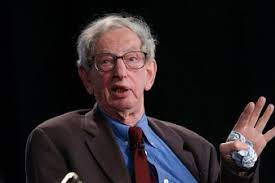Hobsbawm, J. Eric

Bio: (1917-2012) British historian. Eric Hobsbawm received his doctorate in history from Cambridge and taught at Kings College in Cambridge. Hobsbawm primarily studied social history from Marxist positions. As a historian, he is best known for four books that together cover the period from 1789 to 1991 - The Age of Revolution: Europe 1789-1848 (1962), The Age of Capital: 1848-1875 (1975), The Age of Empire, 1875–1914 (1987), The Age of Extremes: The Short Twentieth Century, 1914-1991 (1994). He is the founder of the journal Past and Present, which is dedicated to the Marxist view of history. In his study of Luddites and similar movements and riots that destroyed industrial machines, he concluded that this type of protest was not directed at the machines themselves, but at the machines as tools of capitalist exploitation. Since there were no systematic and political ways of protesting, Hobsbawm called these types of protests "collective bargaining by riot." Even when the English Parliament declared the destruction of industrial machines a crime punishable by the death penalty, such protests did not stop.
Hobsbawm had the greatest influence on sociology by developing the concept of "invented traditions". With the creation of new bourgeois societies in Western Europe in the 18th and 19th centuries, it was necessary to create a basis for solidarity between workers and capitalists, and for that purpose, bourgeois intellectuals invented and promoted the ideology of common ethnocultural identity and common past. Unlike customs that were changeable, traditions were portrayed as constant and unchanging. These fictional traditions were supposed to create public symbols that would be the basis of national identity and national project. As an empirical example of a fictional tradition, Hobsbawm describes the emergence of kilts in Scotland, which were introduced by the English capitalist, as well as the use of turbans in India, which was also introduced by the English.
Fields of research
Capitalism Capitalist Class Culture Customs, Social Democracy Economy Empire Ethnicity Exploatation, Economic Globalization History Identity Ideology Industry Monarchy Movements, Social Myth Protests Public Opinion Sign and Symbol Solidarity Terrorism Tradition Working ClassTheoretical approaches
Marxism – Historical MaterialismMain works
Primitive Rebels: Studies in Archaic Forms of Social Movement in the 19th and 20th Centuries (1959);
The Age of Revolution: Europe 1789-1848 (1962);
Labouring Men: Studies in the History of Labour (1964);
Industry and Empire (1968);
The Age of Capital: 1848-1875 (1975);
The Invention of Tradition (1983);
The Age of Empire, 1875–1914 (1987);
Nations and Nationalism Since 1780: Programme, Myth, Reality (1990);
Echoes of the Marseillaise (1994);
The Age of Extremes: The Short Twentieth Century, 1914-1991 (1994);
On History (1997);
Globalization, Democracy and Terrorism (2007);
Fractured Times: Culture and Society in the Twentieth Century (2013).

